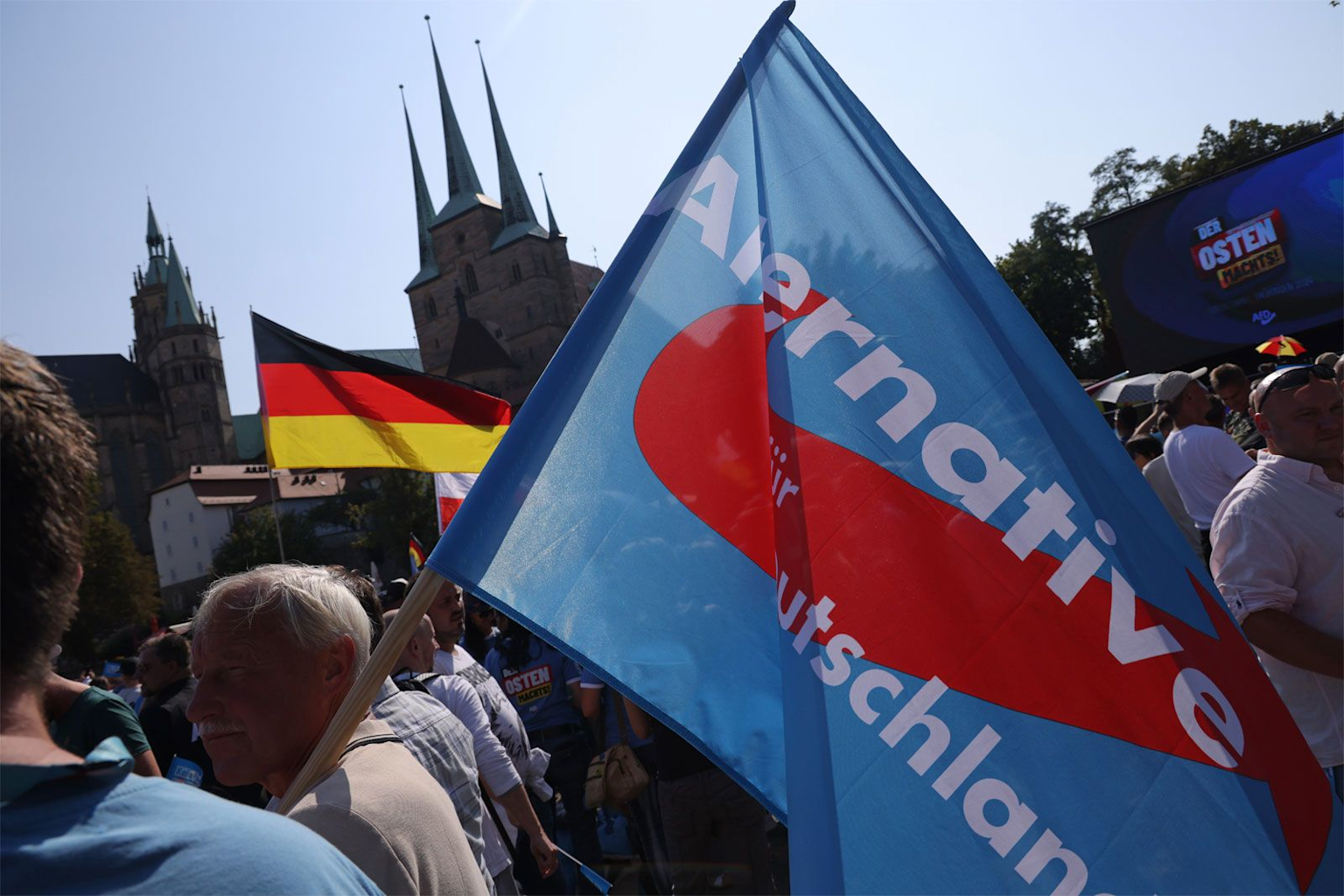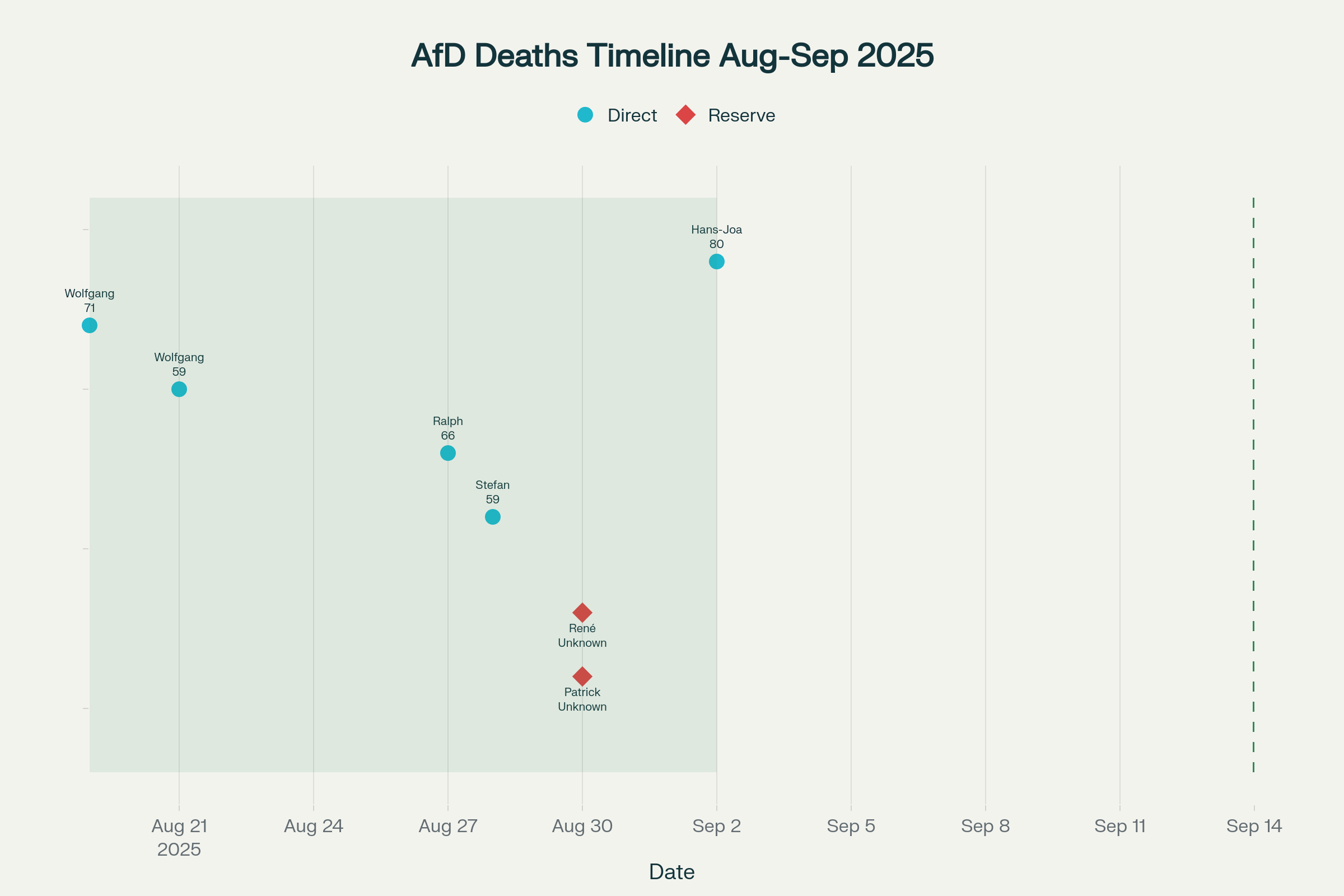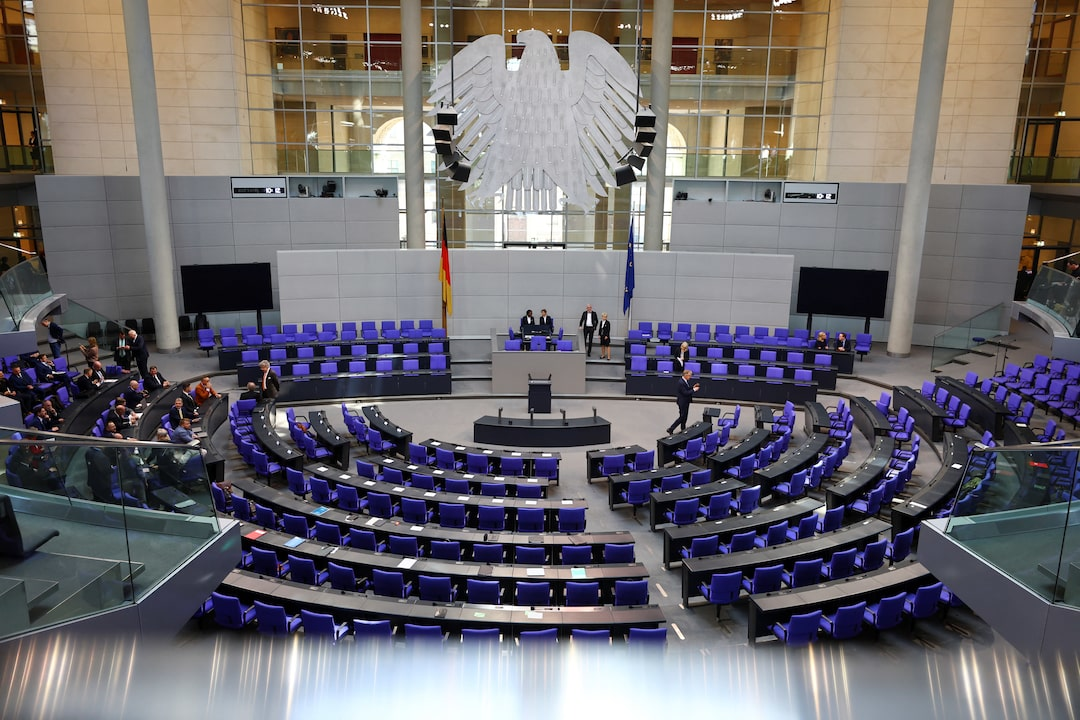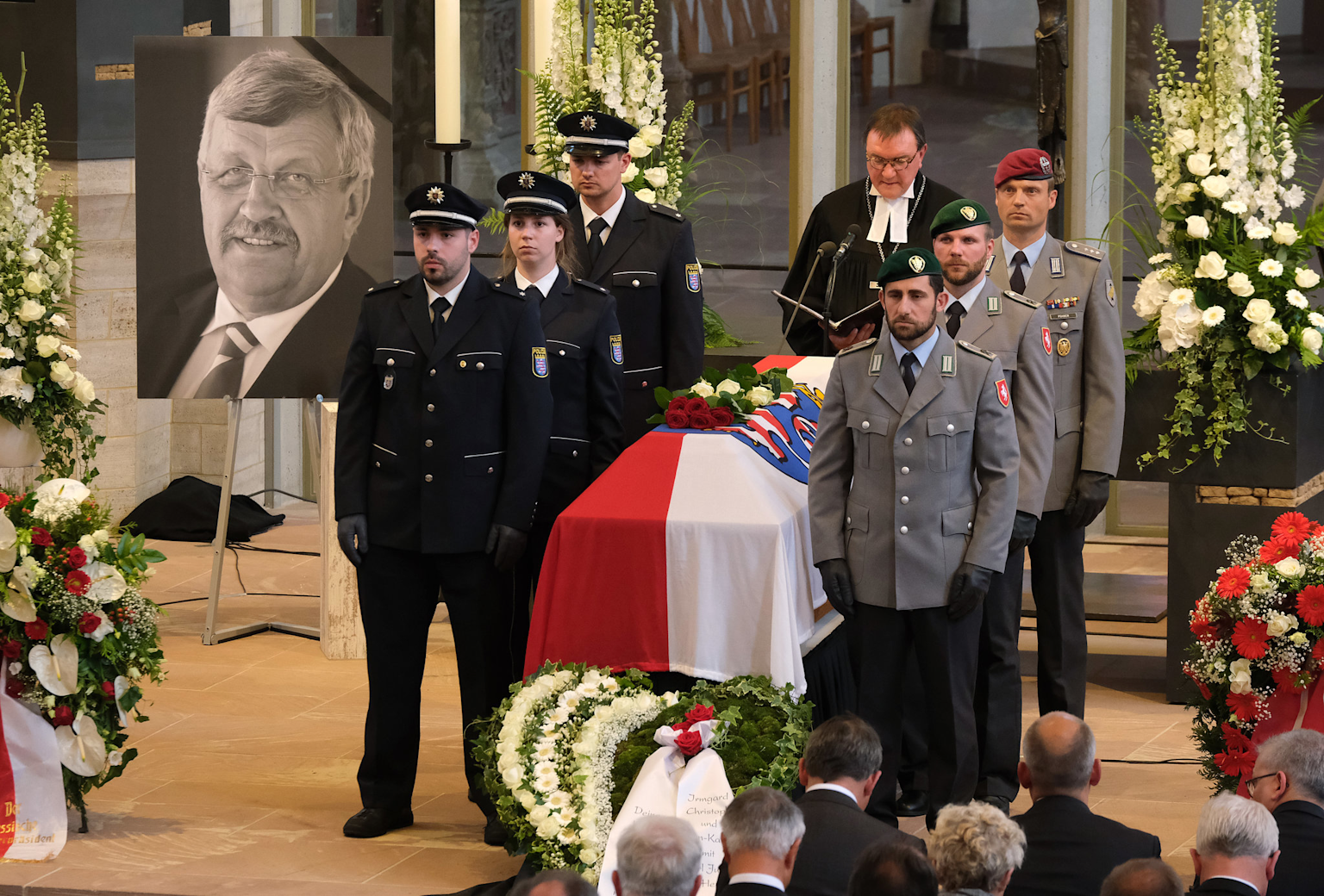The Seven Deaths: A Comprehensive Investigation into the AfD Candidate Deaths in North Rhine-Westphalia
Between August 19 and September 2, 2025, seven candidates from Germany’s far-right Alternative für Deutschland (AfD) party died within a 14-day period ahead of local elections in North Rhine-Westphalia, Germany’s most populous state. While German authorities have found no evidence of foul play, the unprecedented clustering of deaths among politicians from a single party has sparked intense speculation, conspiracy theories, and broader questions about political violence in contemporary Germany. This investigation examines the circumstances, individuals involved, official responses, and wider implications of these remarkable events.

An Alternative for Germany (AfD) party flag and German national flag at a political rally in Germany
The Deceased Candidates: Individual Cases and Circumstances
Direct Candidates
The deaths involved five direct candidates running for municipal council positions across various cities in North Rhine-Westphalia. Wolfgang Klinger, aged 71, was the first to die on August 19, 2025, in Schwerte. Local authorities reported his death as unexpected, attributing it to chronic diseases. Just two days later, Wolfgang Seitz, 59, died in Rheinberg from what officials described as a heart attack with pre-existing conditions noted.
The sequence continued with Ralph Klaus Norbert Lange, 66, who died on August 27, 2025, in Blomberg from chronic diseases. His death was officially announced by the City of Blomberg, which stated that all affected voters would automatically receive new postal ballots. The following day, Stefan Berendes, also 59, died unexpectedly in Bad Lippspringe, with the city confirming his sudden passing and announcing ballot reprints.
The most recent death was Hans-Joachim Kind, 80, who died on September 2, 2025, in Kremenholl after a long illness. Unlike the others, Kind’s death was explicitly attributed to natural causes following an extended period of poor health.
Reserve Candidates

Two reserve candidates also died during this period. René Herford succumbed to kidney failure following a liver disease, while Patrick Tietze died by suicide. Both were reserve list candidates from the Oberbergischer Kreis area, and their deaths were confirmed by Kay Gottschalk, the AfD’s deputy state chairman in North Rhine-Westphalia.

Timeline of AfD candidate deaths in North Rhine-Westphalia leading up to September 14, 2025 election
Statistical Analysis and Conspiracy Theories
The rapid succession of deaths prompted Stefan Homburg, a retired economics professor from the University of Hannover, to declare the cluster “statistically almost impossible” in a post on X (formerly Twitter). Homburg’s assertion was amplified when Alice Weidel, AfD co-leader, retweeted his statement, adding credibility to conspiracy theories circulating on social media.
The mathematical improbability argument gained further traction when Elon Musk, who has publicly supported AfD policies, responded to the discussion with an exclamation mark, effectively signal-boosting the conspiracy theories to his massive social media following. Musk has previously stated that “Either Germany votes AfD, or it is the end of Germany,” demonstrating his investment in the party’s electoral success.
However, statistical analysis requires context. North Rhine-Westphalia’s Interior Ministry pointed out that candidates from other parties, including the Greens and Social Democrats, also died during the same period. Specifically, Green Party candidate Klaus Reger in Hellenthal and Social Democrat Leonore Jansen in Bad Münstereifel also passed away, bringing the total candidate deaths across all parties to ten.
Official Investigation and Response
Police and Security Services
German police and intelligence services have been unequivocal in their findings. According to statements to the DPA news agency, the deaths were either from natural causes or the causes were withheld for family privacy reasons. No evidence of foul play has been discovered in any of the cases.
Kay Gottschalk, the AfD’s deputy state chairman in North Rhine-Westphalia, acknowledged the speculation but urged caution. Speaking to Politico’s Berlin Playbook Podcast, he stated: “What I have in front of me is just partial information that doesn’t back up these suspicions at the moment.” He emphasized the need for thorough investigation “without immediately getting into conspiracy-theory territory” while respecting the grieving families.
Administrative Consequences
The deaths created significant logistical challenges for election officials. New ballots had to be printed and distributed, with some postal voters required to recast their votes. The City of Blomberg confirmed that approximately 200 voters in the Schwerte-Mitte V district were affected, requiring new postal voting documents.
Election officials worked to ensure the September 14, 2025 election could proceed as planned, with some areas conducting by-elections where necessary. The administrative burden demonstrated the practical impact of the deaths beyond their political implications.

Interior of the German Bundestag parliament chamber showcasing the seating and federal eagle emblem where AfD politicians serve
Political Context and AfD’s Rise
Electoral Significance
The deaths occurred as the AfD was experiencing unprecedented growth in North Rhine-Westphalia. The party’s support had surged from just 5.4% in the May 2022 state elections to 16.8% in the February 2025 federal elections. This represents more than a tripling of support in a region traditionally dominated by centrist parties.
The September 14, 2025 local elections were viewed as a crucial test of whether the AfD could expand beyond its eastern German strongholds into western industrial regions. With over 20,000 candidates competing across 427 municipalities in the state of 18 million people, the elections represented a significant opportunity for the party to establish a foothold in Germany’s economic heartland.
Intelligence Surveillance
The deaths occurred against the backdrop of intensified scrutiny from German intelligence services. In May 2025, the Federal Office for the Protection of the Constitution (BfV) classified the entire AfD as a “confirmed right-wing extremist organization” following a three-year investigation and a 1,100-page report.
This classification, unprecedented for a major opposition party in post-war Germany, granted intelligence services enhanced surveillance powers, including the ability to use wiretaps and recruit informants within the party. The designation was temporarily suspended pending legal appeals, but several state-level AfD branches, particularly in eastern Germany, remain classified as extremist.
Historical Context: Political Violence in Germany
The Lübcke Assassination Precedent
The speculation surrounding the AfD deaths gains context from Germany’s recent experience with far-right political violence. The 2019 assassination of Walter Lübcke, a CDU politician and supporter of Angela Merkel’s refugee policies, marked the first far-right political assassination in post-war Germany.
Lübcke was shot in the head at close range on his terrace by Stephan Ernst, a neo-Nazi with connections to the extremist group Combat 18. The assassination followed years of death threats triggered by Lübcke’s defense of refugee policies at a 2015 town hall meeting.
The Lübcke case established several precedents relevant to the current situation: the role of online incitement in political violence, the targeting of politicians who support immigration, and the connection between far-right rhetoric and actual violence. It also highlighted the German security services’ historical underestimation of far-right threats.
Rise in Political Violence
Germany has experienced a significant increase in attacks on politicians. The Federal Criminal Police reported 5,400 crimes against public officials and elected representatives, with attacks on local politicians tripling over the past five years. Recent incidents include the hospitalization of Social Democratic candidate Matthias Ecke after an attack in Dresden and an assault on former Berlin mayor Franziska Giffey.
This broader pattern of political violence adds complexity to the AfD deaths. While violence typically targets politicians supporting immigration or democratic institutions, the death of AfD candidates—who oppose immigration—would represent a departure from established patterns.

Memorial ceremony for a high-profile German political figure associated with far-right violence, featuring police and military honor guards and floral tributes
Extremist Connections and Security Concerns
Combat 18 and Neo-Nazi Networks
The AfD has documented connections to extremist organizations that have engaged in political violence. The 2019 Lübcke assassination involved connections to Combat 18, a militant neo-Nazi organization that originated in Britain and spread to Germany. German authorities banned Combat 18 in January 2020, conducting raids across six states and seizing weapons and extremist materials.
Several AfD members have been linked to violent extremist plots. Former MP Birgit Malsack-Winkemann was central to the Patriotische Union, a group that planned a violent coup. At least three members of the terrorist cell Sächsische Separatisten, which plotted ethnic cleansing in Saxony, were members of the AfD’s youth wing.
Intelligence Assessment
German domestic intelligence has identified the AfD as promoting “racist and anti-Muslim ideologies” that “undermine entire segments of the German population and infringe upon their human dignity”. The BfV’s assessment noted the party’s connections to “New Right networks, far-right publishers, the Identitarian Movement, and other extremist groups”.
The intelligence assessment raises questions about whether the AfD deaths could represent internal extremist conflicts, rival group targeting, or state-sponsored elimination. However, no evidence has emerged to support any of these theories.
International Dimensions and Foreign Interest
US Political Involvement
The AfD deaths have attracted attention from prominent American political figures. Marco Rubio, US Secretary of State, condemned the German intelligence classification of the AfD as “tyranny in disguise,” describing it as an attack on democracy. Rubio argued that the unpopular policies were not the AfD itself but rather “the establishment’s harmful open border immigration policies that the AfD opposes”.
Elon Musk has consistently supported the AfD, stating that banning the party would be “an extreme attack on democracy” and warning that Germany must “vote AfD or it is the end of Germany”. His amplification of conspiracy theories surrounding the deaths demonstrates how international figures can influence domestic German political narratives.
Russian and Chinese Connections
The AfD has faced criticism over allegations of harboring spies and agents for Russia and China. These foreign intelligence connections add another layer of complexity to the deaths, though no evidence has linked foreign actors to the candidate fatalities.
Broader Implications for German Democracy
Constitutional Protection
The classification of the AfD as extremist represents a significant test of Germany’s constitutional defense mechanisms. The Federal Office for the Protection of the Constitution operates under strict legal limitations, a legacy of Germany’s experiences with Nazi and Communist surveillance states.
The ability to monitor and potentially ban extremist parties while maintaining democratic norms represents a delicate balance. The AfD’s legal challenges to the extremist classification demonstrate how these mechanisms can be contested through democratic institutions.
Electoral Impact
The deaths have created uncertainty about their electoral impact. While some observers suggest the deaths and surrounding conspiracy theories could generate sympathy votes for the AfD, others argue they may highlight the party’s extremist connections and deter moderate voters.
Polling data shows the AfD reaching unprecedented levels of support, with some surveys showing 26% nationally, making it Germany’s leading party for the first time. The September 14, 2025 North Rhine-Westphalia elections were viewed as a crucial test of whether this support could translate into local political power.
Investigative Limitations and Unanswered Questions
Information Gaps
Several aspects of the deaths remain unclear or underreported. The exact dates of death for reserve candidates René Herford and Patrick Tietze have not been publicly disclosed, referred to only as “late August 2025”. The specific medical conditions underlying the natural deaths have largely been withheld for family privacy.
Methodological Challenges
Investigating potential foul play in deaths attributed to natural causes presents inherent challenges. Without autopsies or toxicology reports—which are not routinely performed for apparent natural deaths—definitive conclusions about causation remain difficult.
The clustering of deaths among candidates from a single party in a short timeframe represents an unusual statistical occurrence, but statistical improbability alone does not constitute evidence of criminal activity.
Conclusion: Tragedy, Speculation, and Democratic Resilience
The seven deaths of AfD candidates in North Rhine-Westphalia represent either an extraordinary coincidence or something more sinister that has yet to be proven. While German authorities have found no evidence of foul play, the unprecedented nature of the clustering has inevitably generated speculation and conspiracy theories.
The deaths occurred within a broader context of rising political violence in Germany, increasing polarization around immigration policies, and growing support for far-right parties across Europe. The AfD’s classification as an extremist organization and its connections to violent extremist networks add layers of complexity to the situation.
Ultimately, the deaths highlight the fragility of democratic discourse and the ease with which tragic events can be weaponized for political purposes. Whether the deaths represent random tragedy or coordinated action, they underscore the challenges facing liberal democracies in an era of rising extremism and declining trust in institutions.
The September 14, 2025 elections proceeded as scheduled, with new ballots printed and electoral processes adapted to account for the deceased candidates. This administrative response demonstrates the resilience of democratic institutions even in the face of unprecedented challenges, while the ongoing speculation illustrates how modern information environments can amplify uncertainty and distrust.
As investigations continue and legal challenges to the AfD’s extremist classification work through German courts, the seven deaths will likely remain a touchstone for debates about political violence, conspiracy theories, and the limits of democratic tolerance for extremist movements in contemporary Germany.
Here are all the source URLs referenced in the report and script:
Primary News Sources
- BBC News: https://www.bbc.co.uk/news/articles/c5ykyewrerpo – “Germany’s far-right AfD suffers series of candidate deaths”
- Newsweek: https://www.newsweek.com/far-right-german-afd-candidates-die-before-election-north-rhine-westphalia-2123763 – “Six Far-Right German AfD Candidates Die Days Before Election”
- New York Post: https://nypost.com/2025/09/02/world-news/six-candidates-from-germanys-rightwing-afd-party-die-days-apart-in-lead-up-to-local-elections-reports/
- The Independent: https://www.independent.co.uk/news/world/europe/germany-afd-candidates-dead-election-b2819180.html
- Washington Examiner: https://www.washingtonexaminer.com/news/world/3791131/seven-german-afd-politicians-dead-within-weeks-ahead-of-elections/
- Ground News: https://ground.news/article/within-two-weeks-four-afd-politicians-from-north-rhine-westphalia-have-died_6e2124
- Economic Times: https://economictimes.com/news/international/us/tragedy-strikes-far-right-afd-as-six-candidates-die-ahead-of-german-local-election/articleshow/123681375.cms
- European Conservative: https://europeanconservative.com/articles/news/seventh-afd-candidate-dead-in-north-rhine-westphalia-election-campaign/
- Gazeta Express: https://www.gazetaexpress.com/en/Germany’s-far-right-AfD-party-experiences-series-of-candidate-deaths-ahead-of-local-elections/
- IZ.RU: https://iz.ru/en/node/1948043 – “The number of deceased AFD candidates increased to seven”
German Intelligence and Security
- Reuters: https://www.reuters.com/world/europe/german-spy-agency-ranks-far-right-afd-extremist-2025-05-02/
- CNN: https://www.cnn.com/2025/05/02/europe/afd-german-spy-agency-extremist-intl
- NPR: https://www.npr.org/2025/05/02/g-s1-64037/afd-germany-extremist-alternative
- Al Jazeera: https://www.aljazeera.com/news/2024/5/13/court-confirms-german-intelligence-surveillance-of-extremist-afd
- Euronews: https://www.euronews.com/2025/05/08/germanys-spy-agency-suspends-extremist-classification-for-afd-party-says-court
- DW (Deutsche Welle): https://www.dw.com/en/german-afd-party-right-wing-extremist-label-fact-check/a-72495162
- Politico: https://www.politico.com/news/2025/05/02/marco-rubio-germany-afd-00324283
Walter Lübcke Assassination Context
- CNN: https://www.cnn.com/2019/06/17/europe/walter-lubcke-german-politician-killing-grm-intl
- NPR: https://www.npr.org/2019/07/01/737561640/a-german-politicians-assassination-prompts-new-fears-about-far-right-violence
- DW: https://www.dw.com/en/walter-l%C3%BCbcke-remembering-a-political-murder-that-shook-germany/a-69237935
- BBC: https://www.bbc.co.uk/news/world-europe-55824282 – “German far-right gunman gets life for murder of politician Lübcke”
- New York Times: https://www.nytimes.com/2019/07/07/world/europe/germany-murder-far-right-neo-nazi-luebcke.html
- Wikipedia: https://en.wikipedia.org/wiki/Murder_of_Walter_L%C3%BCbcke
Extremist Groups and Combat 18
- DW: https://www.dw.com/en/raids-in-6-states-as-germany-bans-combat-18-neo-nazi-group/a-52116504
- BBC: https://www.bbc.co.uk/news/world-europe-51219274 – “Germany bans Combat 18 as police raid neo-Nazi group”
- Al Jazeera: https://www.aljazeera.com/news/2024/11/6/germanys-far-right-afd-to-expel-members-over-links-to-militant-groups
Academic and Analysis Sources
- ICCT: https://icct.nl/publication/radicalisation-designation-afds-extremist-turn
- Brookings: https://www.brookings.edu/articles/german-radical-right-threatens-the-survival-of-democracy/
- Courthouse News: https://www.courthousenews.com/germany-struggles-to-stem-far-right-tide-5-years-after-politicians-assassination/
Election Information
Social Media and Tech Platform Sources
- X (Twitter) – Grok shares: Multiple X/Grok share links referenced in search results
- YouTube Videos:
News Aggregators and International Coverage
- GZERO Media: https://www.gzeromedia.com/news/hard-numbers/hard-numbers-string-of-afd-candidate-deaths-another-tragedy-in-darfur-trump-seeks-a-department-of-war-more
- NAMPA: https://www.nampa.org/text/22725999
- AA (Anadolu Agency): https://www.aa.com.tr/en/europe/german-intelligence-agency-classifies-afd-party-as-proven-extremist-group-/3554911
Reddit Discussions
- Reddit – r/Asmongold: https://www.reddit.com/r/Asmongold/comments/1n7x56p/insane_news_out_of_germany_as_a_seventh_afd/
- Reddit – r/europe: https://www.reddit.com/r/europe/comments/1n6v1e5/germanys_farright_afd_suffers_series_of_candidate/
Alternative News Sources
- EADaily: https://eadaily.com/en/news/2025/08/31/in-germany-four-candidates-from-the-afd-suddenly-died-shortly-before-the-election
- AInvest: https://www.ainvest.com/news/germany-afd-faces-candidate-losses-election-bid-north-rhine-westphalia-2509/
- Diritto UE: https://www.dirittoue.info/german-domestic-intelligence-agency-officially-designated-the-entire-political-party-alternative-for-germany-afd-as-a-confirmed-far-right-extremist-organization/
Note: Some URLs may have paywalls or geographic restrictions. The investigation drew from a wide range of international and German sources to provide comprehensive coverage of this developing story.

